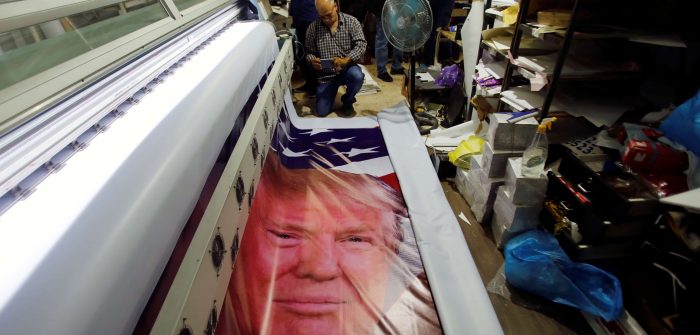A Dangerous Coin Toss
For long-time scholar of American foreign policy, William Quandt, it’s still too hard to say what Trump wants in the Middle East

Palestinians print Donald Trump poster ahead of his visit to the West Bank town of Bethlehem, May 21, 2017. Mussa Qawasma/Reuters
William B. Quandt was privy to many turning points in U.S. foreign policy: he served on the National Security Council under the Richard Nixon and Jimmy Carter administrations and played an active role in the negotiations that led to the Camp David accords and the Egyptian–Israeli peace treaty. And yet, he cannot pin down Donald Trump’s plans for the Middle East.
Elected for his non-conventionalism, attitude of irreverence, and not much else, Trump has a personal brand that informs his “distinctive” foreign policy in the Middle East, argued Quandt in a talk he gave this fall at the American University in Cairo. Trump’s ultimate goal to get the best deal possible—rooted in his real estate credentials and background— has severe implications for international diplomacy and trade relations. For example, his perspective on international negotiations is zero-sum: “You either win or lose. You’re either strong or weak,” Quandt said.
This certainly explains Trump’s skepticism of multilateral institutions and agreements. Trump discredited the United Nations and NATO, promised he would withdraw from the World Trade Organization, renegotiated multilateral trade deals like NAFTA, and pulled out of the Paris climate agreement, all of which tie the hands of the United States, Quandt said. More than international cooperation, Trump values bilateralism and believes one-on-one agreements are far more effective than multilateral deals.
The art of deal-making is the backbone of Trump’s policy regarding the Israeli– Palestinian dispute. Trump made an infamous campaign promise to “make the deal of the century,” but took missteps to accomplish it: first, he appointed his son-in-law Jared Kushner and two other close associates, known to be sympathetic to hardliners in Israel, and second, cut funding for the United Nations Relief and Works Agency for Palestine Refugees in the Near East (UNRWA) and closed PLO offices in Washington. “We have yet seen nothing but retreat from anything like a credible peace process in my mind”—a process which Quandt told the Cairo Review is “dead in the water.” Plans to reveal the deal have been delayed for months, their provisions rumored to be unacceptable to the Palestinians.
Quandt nonetheless agrees with Trump on two main points: he believes the U.S. invasion of Iraq in 2003 under the tutelage of George W. Bush was a mistake, and faults Barack Obama for prematurely pulling out of the country and creating a power vacuum that the Islamic State in Iraq and Syria (ISIS) filled. “The United States is not particularly good at the goal of imperialism,” Quandt quipped, adding that he supports Trump’s skepticism about remaking the world.
The United States’s involvement in Iraq fifteen years ago has exacerbated the humanitarian crisis within the country. Quandt thinks Trump’s instinct to withdraw American military forces from countries like Iraq, Afghanistan, and Syria is a good one—even if it does not happen quickly due to entrenched bureaucracy in those countries. Regardless of whether American troops remain in the Middle East, it is likely that the United States will no longer play a large role in determining the future of Arab countries. In Syria, for example, Quandt notes that the Russians, Turks, Iranians, and the Syrian regime have a deepening role in the conflict, but “nobody thinks that the United States is a major player in that game.”
Trump’s isolationist foreign policy stands in contrast to that of Obama because of its comparable heavy-handedness. Trump has pulled back from a strong global presence politically and economically, leaving power in the region up for grabs.
While signs point to Russia becoming the next powerhouse in the region, it is telling that the current U.S. administration has embraced three key players in the region: Saudi Arabia, the United Arab Emirates, and Israel. Mainly, Quandt argued, these new alliances are meant to guard against Iranian expansionism. Trump himself has even floated the idea of sponsoring an Arab NATO, a body composed of Arab troops to stand against the Persian threat.
Ironically enough, despite Trump’s overuse of slogans like “America First” and “Make America Great Again,” he has stepped back from previous administrations’ efforts to shape the Middle East and seems content to let other countries pick up the slack. This break from the past has made it difficult for scholars and observers to anticipate his next move. How does Quandt recommend we make our predictions then? “It’s probably best to just flip a coin.”


